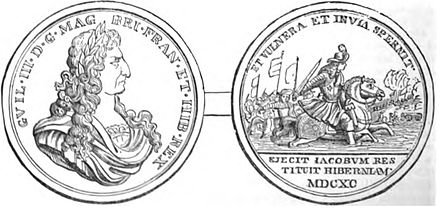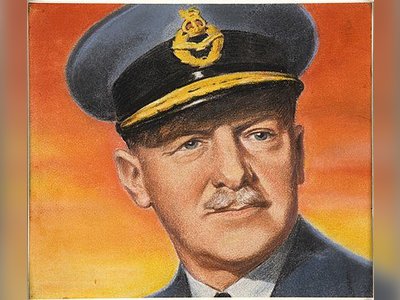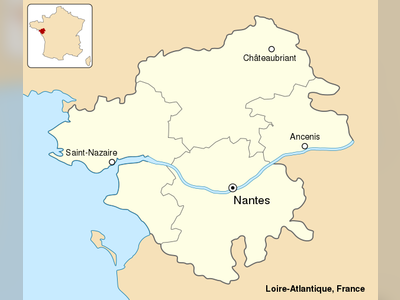British Heritage
Remember, Cherish, Learn.
beta
Battle of the Boyne
Contribution of the Battle of the Boyne to British Heritage.
The Battle of the Boyne, fought on 1 July 1690, holds a significant place in British history as it was a pivotal event in the struggle for the British crown and had far-reaching consequences for the balance of power in the region. The battle was fought between the deposed King James II of England and Ireland, who sought to regain his throne, and his son-in-law King William III (also known as William of Orange), who had ascended to the throne along with his wife Queen Mary II after the Glorious Revolution of 1688. This battle played a crucial role in shaping the course of British history and further cemented the Protestant ascendancy in Ireland.
The legacy of the Battle of the Boyne lies in its decisive outcome in favor of King William III. William's victory over James II at the Boyne marked a turning point in James's failed attempt to reclaim the British crown. Following the defeat, James fled to France and never returned to England or Ireland. The battle essentially solidified the Protestant rule in Britain, and it became a symbol of the supremacy of Protestantism over Catholicism in the region.
The Battle of the Boyne also had broader geopolitical implications, as it was part of the larger War of the Grand Alliance, a coalition formed by Protestant countries and the Vatican to resist the expansionist ambitions of Catholic Louis XIV of France. William's victory at the Boyne bolstered the League of Augsburg, the alliance against Louis XIV, and encouraged more nations to join the coalition against French aggression in Europe.
The Battle of the Boyne is deeply intertwined with British heritage due to its impact on the Protestant ascendancy in Ireland. The victory secured William III's position on the throne and ensured the continued rule of Protestant monarchs in Britain. It also reinforced the Protestant control in Ireland and helped maintain British dominance over the island.
The battle's significance extends beyond Britain and Ireland, as it played a critical role in the European balance of power. By aligning with the League of Augsburg and securing victory at the Boyne, William III contributed to the resistance against French hegemony and strengthened the position of Protestant nations in the larger European context.
King William III's triumph at the Battle of the Boyne was a testament to his strategic acumen and leadership on the battlefield. Although he had yet to achieve a major victory before this battle, William's success in the Netherlands against the French had been based on tactical maneuvering and diplomatic skill. His ability to assemble a multi-national coalition, the League of Augsburg, was a testament to his diplomatic prowess in countering French aggression.
At the Battle of the Boyne, William's forces, consisting of well-trained and equipped troops from various nations, displayed superior firepower and discipline, which ultimately led to their victory. Despite facing resistance from the Jacobite army, including elite French troops, William's forces overcame the challenges and secured a strategic victory.
The Battle of the Boyne took place on 1 July 1690 (Old Style) across the River Boyne, near the town of Drogheda in what is now the Republic of Ireland. The battle was fought between the forces of deposed King James II and his son-in-law, King William III, who had become King of England and Scotland following the Glorious Revolution of 1688.
The conflict had broader European implications, as it was part of the War of the Grand Alliance, a coalition of Protestant countries and the Vatican formed to resist the expansionist ambitions of Catholic King Louis XIV of France. Pope Alexander VIII was an ally of King William and opposed James II, who supported Louis XIV's objectives in Europe.
The war in Ireland had a sectarian and ethnic dimension, with Jacobite forces fighting for Irish sovereignty, religious tolerance for Catholicism, and land ownership. The majority of Irish people supported James II due to his Declaration of Indulgence, which granted religious freedom to all denominations in England and Scotland. In contrast, the Williamites in Ireland fought to maintain Protestant rule and feared a return to Catholic dominance, which they associated with the Irish Rebellion of 1641.
The opposing armies in the Battle of the Boyne were led by King James II and King William III. James's supporters controlled most of Ireland, and he also received military support from his cousin, King Louis XIV of France. In contrast, William was able to call on troops from various countries, including Denmark, the Netherlands, and England, thanks to his diplomatic efforts in forming the League of Augsburg.
The battle itself saw William's well-trained and equipped troops gradually pushing back the Jacobite forces, leading to a victory for William. James II fled to France after the battle, effectively ending his hope of regaining the throne through military means.
The casualties of the Battle of the Boyne were relatively low compared to the scale of the conflict, with around 2,000 deaths out of approximately 50,000 participants. The battle marked the beginning of the end for James's attempts to regain the crown, and the Williamites triumphantly marched into Dublin two days after the battle.
The Battle of the Boyne holds a prominent place in British heritage due to its contribution to the Protestant ascendancy in Ireland and its broader impact on the European balance of power. King William III's strategic victory at the Boyne secured his position on the throne and further solidified the rule of Protestant monarchs in Britain. The battle's legacy continues to be remembered and celebrated by the Protestant Orange Order on the Twelfth of July, despite remaining a controversial topic in Northern Ireland. As the centuries pass, the significance of the Battle of the Boyne endures, representing a critical moment in British history and the wider European geopolitical landscape.
Legacy
The legacy of the Battle of the Boyne lies in its decisive outcome in favor of King William III. William's victory over James II at the Boyne marked a turning point in James's failed attempt to reclaim the British crown. Following the defeat, James fled to France and never returned to England or Ireland. The battle essentially solidified the Protestant rule in Britain, and it became a symbol of the supremacy of Protestantism over Catholicism in the region.
The Battle of the Boyne also had broader geopolitical implications, as it was part of the larger War of the Grand Alliance, a coalition formed by Protestant countries and the Vatican to resist the expansionist ambitions of Catholic Louis XIV of France. William's victory at the Boyne bolstered the League of Augsburg, the alliance against Louis XIV, and encouraged more nations to join the coalition against French aggression in Europe.
Contribution to British Heritage
The Battle of the Boyne is deeply intertwined with British heritage due to its impact on the Protestant ascendancy in Ireland. The victory secured William III's position on the throne and ensured the continued rule of Protestant monarchs in Britain. It also reinforced the Protestant control in Ireland and helped maintain British dominance over the island.
The battle's significance extends beyond Britain and Ireland, as it played a critical role in the European balance of power. By aligning with the League of Augsburg and securing victory at the Boyne, William III contributed to the resistance against French hegemony and strengthened the position of Protestant nations in the larger European context.
Success of King William III
King William III's triumph at the Battle of the Boyne was a testament to his strategic acumen and leadership on the battlefield. Although he had yet to achieve a major victory before this battle, William's success in the Netherlands against the French had been based on tactical maneuvering and diplomatic skill. His ability to assemble a multi-national coalition, the League of Augsburg, was a testament to his diplomatic prowess in countering French aggression.
At the Battle of the Boyne, William's forces, consisting of well-trained and equipped troops from various nations, displayed superior firepower and discipline, which ultimately led to their victory. Despite facing resistance from the Jacobite army, including elite French troops, William's forces overcame the challenges and secured a strategic victory.
General Information about the Battle
The Battle of the Boyne took place on 1 July 1690 (Old Style) across the River Boyne, near the town of Drogheda in what is now the Republic of Ireland. The battle was fought between the forces of deposed King James II and his son-in-law, King William III, who had become King of England and Scotland following the Glorious Revolution of 1688.
The conflict had broader European implications, as it was part of the War of the Grand Alliance, a coalition of Protestant countries and the Vatican formed to resist the expansionist ambitions of Catholic King Louis XIV of France. Pope Alexander VIII was an ally of King William and opposed James II, who supported Louis XIV's objectives in Europe.
The war in Ireland had a sectarian and ethnic dimension, with Jacobite forces fighting for Irish sovereignty, religious tolerance for Catholicism, and land ownership. The majority of Irish people supported James II due to his Declaration of Indulgence, which granted religious freedom to all denominations in England and Scotland. In contrast, the Williamites in Ireland fought to maintain Protestant rule and feared a return to Catholic dominance, which they associated with the Irish Rebellion of 1641.
The opposing armies in the Battle of the Boyne were led by King James II and King William III. James's supporters controlled most of Ireland, and he also received military support from his cousin, King Louis XIV of France. In contrast, William was able to call on troops from various countries, including Denmark, the Netherlands, and England, thanks to his diplomatic efforts in forming the League of Augsburg.
The battle itself saw William's well-trained and equipped troops gradually pushing back the Jacobite forces, leading to a victory for William. James II fled to France after the battle, effectively ending his hope of regaining the throne through military means.
The casualties of the Battle of the Boyne were relatively low compared to the scale of the conflict, with around 2,000 deaths out of approximately 50,000 participants. The battle marked the beginning of the end for James's attempts to regain the crown, and the Williamites triumphantly marched into Dublin two days after the battle.
Conclusion
The Battle of the Boyne holds a prominent place in British heritage due to its contribution to the Protestant ascendancy in Ireland and its broader impact on the European balance of power. King William III's strategic victory at the Boyne secured his position on the throne and further solidified the rule of Protestant monarchs in Britain. The battle's legacy continues to be remembered and celebrated by the Protestant Orange Order on the Twelfth of July, despite remaining a controversial topic in Northern Ireland. As the centuries pass, the significance of the Battle of the Boyne endures, representing a critical moment in British history and the wider European geopolitical landscape.
- Battle of the Boyneen.wikipedia.org














